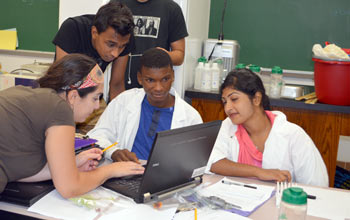Participation Requirements
- Accepted students must attend the UBRP training course at the DNALC NYC in Downtown Brooklyn. The first required lab training course will take place August 25-29, and additional sessions will be scheduled during the school year.
- Mentors and students define a work schedule to accomplish a minimum of 55 hours of research during the academic year to complete their project in time for presentation at a symposium in the spring.
- Mentors help students plan, develop and conduct a DNA barcoding project. Key components of the research cycle include writing a research proposal, fieldwork and/or sample collection, DNA isolation, amplification of DNA barcoding regions, and analysis of DNA sequences.
- Project staff coordinate with teams and mentors to ensure that projects are rigorous and appropriately scaled to achieve results during the time allotted.
- Mentors receive a stipend of $2,000, in addition, the costs associated with obtaining and sequencing 30 specimens will be covered. Mentors also directly impact the science education and career trajectory of urban high school students.
- Students who complete the 55 hours of research and present their projects at the Research Symposium each receive a $500 stipend.
Symposium
The 2024-25 Urban Barcode Research Program Student Symposium will be held Tuesday, May 20, 2025 at the New York City College of Technology (City Tech) in Brooklyn.



